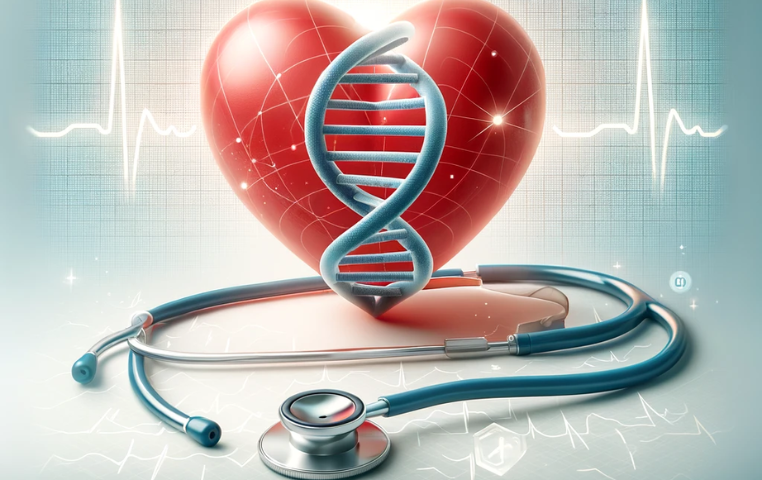When it comes to heart disease, knowledge is power. The sooner you are aware of your heart condition or potential for a heart condition, the better able you will be to seek the treatment needed to minimize or avoid a catastrophic event. There are two primary underlying causes of heart disease. The first is related to one’s lifestyle – do you smoke, are you overweight, do you eat an unhealthy diet, are you stressed…you know, the usual suspects. Another primary cause of some heart diseases is related to family history.
Advancements in genetic testing have opened the door for patients to gain insight into potential genetic abnormalities that may contribute to heart disease. This insight can give you and/or your immediate family members the information needed to proactively manage potential heart conditions.
As a father with heart disease, it’s important for me to understand the potential risk that my 6-year-old may face due to poor genetics. Similarly, I’m interested in understanding the genetics that I inherited from my parents and whether there is anything that could have provided an earlier warning sign.
What Heart Disease Can Genetic Testing Identify?
According to the HeartFoundation, we inherit 20,000-25,000 genes from our parents. Genetic testing looks for mutations in the specific genes that are linked to inherited heart disease, meaning heart disease that can be passed genetically.
In July 2020, the American Heart Association (AHA) released a statement summarizing what they know about genes and their connection to heart disease. In it, they identified four conditions that may have an inherited genetic component:
- Cardiomyopathies: heart muscle diseases that can lead to heart failure
- Thoracic aortic aneurysms and dissections: conditions that cause the body’s major artery to balloon and rupture
- Arrhythmic disorders: disorders that predispose people to potentially fatal abnormal heart rhythms
- Familial hypercholesterolemia: or highly elevated LDL cholesterol levels that greatly increase the risk of heart attack
Each of these conditions has sub-conditions, which are further detailed on the HeartFoundation website. It’s important to note that a positive identification of a mutant gene associated with one of these conditions does not necessarily mean that the disease will develop. But again, knowledge is power, and being aware of the potential for heart disease to develop is a significant advantage.
Dr. Kiran Musunuru, M.D, professor of cardiovascular medicine and genetics at the Perelman School of Medicine at the University of Pennsylvania in Philadelphia and chair of the writing group behind the AHA’s statement, said, “With most genetic cardiovascular diseases, inheriting a mutation (or variant) from a parent substantially increases the risk of getting the disease but does not guarantee the disease. In some cases, it might be possible to act early and prevent the disease. In other cases, having the mutation for a genetically caused cardiovascular condition might lead to different and possibly more aggressive treatment.”
It’s also important to note that people with the same gene variant can be affected in different ways, and genetic testing may not identify all possible gene variants that could cause health problems in the future. If you have been identified to have inherited a mutant gene, your doctor can monitor and order further testing as symptoms develop or as they otherwise deem necessary.
Who Should Get Genetic Testing?
Genetic testing usually starts with a meeting with a genetic counselor who will educate you on the process and the testing results. Given the gravity of the potential news, it’s important to work with someone who understands and can communicate the results and their implications.
Daria Ma, a cardiac genetic counselor with the Cardiogenetics Program at the Cedars-Sinai Smidt Heart Institute in Los Angeles, has identified who should consider genetic testing:
- Someone diagnosed with certain heart diseases or born with a heart defect
- Parents, siblings, or children of someone diagnosed and tested for heart disease
- Parents, siblings, or children of someone who died suddenly of cardiac arrest
If you fit one of those profiles, consider talking to your doctor about genetic testing. Your hospital may be able to conduct genetic testing. Online services such as Invitae, or Genome Medical can also provide support for genetic testing.
Wrapping Up
In all candor, I have not had genetic testing, but given my history of heart disease (aortic aneurysm) and the fact that I have a daughter, I’m putting the steps in motion with my upcoming visit with my doctor. Genetic testing is also recommended by The Ritter Foundation for Aortic Health, which aims to create awareness around aortic health and fund research to save lives. If you fit the profile described above, I encourage you to have a proactive conversation with your doctor to explore genetic testing.
Stay healthy!

